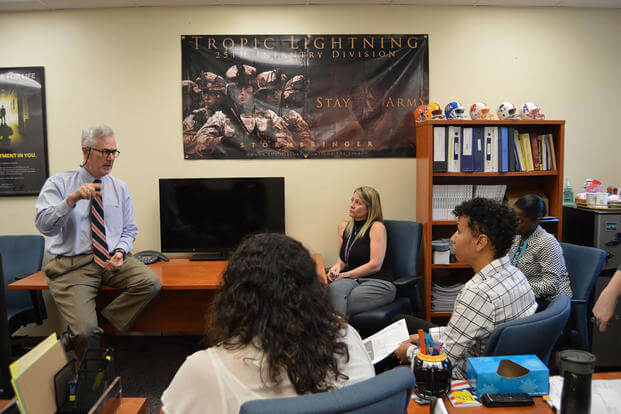Questions about the Transition Assistance Program (TAP) are everywhere. When should military members go through the program? What exactly is taught in the program?
Today's TAP has evolved over time. But just what is included in the mandatory and non-mandatory sections of the transition course?
Pre-Separation Counseling
Pre-separation counseling is a mandatory session where counselors discuss education, training, employment and career goals, financial management, health, well-being, housing and relocation. Service members are encouraged to begin TAP 12-24 months before separation and to complete the capstone course no later than 90 days before separation.
Overview of the Curriculum
The TAP curriculum, known as Transition GPS (Goals, Plans and Success), is a weeklong course filled with activities and discussions to help service members walk away with a personalized plan of success. As no two service members have the same transition, three additional two-day tracks allow service members to navigate and explore different paths. The curriculum is updated annually and based on industry standards. Furthermore, military spouses can also attend for their own benefit during their transition to the civilian world.
To supplement the in-person classroom training and to provide the course for those unable to attend in person, the curriculum is available on Joint Knowledge Online. Veterans, spouses and family members can access the entire Transition GPS curriculum 24/7.
DoD Curriculum Provided During TAP
The DoD curriculum consists of three classes: Resilient Transition, Military Occupation Code (MOC) Crosswalk, and Financial Planning for Transition. The Resilient Transition module uses activities and discussions to present topics about transition concerns and differences between life in the military and civilian sector. Financial Planning discusses the impact transition may have on finances, including a civilian salary equivalent to military pay, and changes in taxes. MOC Crosswalk focuses on using skills, both hard and soft, that service members gained during their service. All modules describe where service members can find additional assistance, both pre- and post-transition.
VA Briefings I and II
The VA creates a plan personalized to each service member and incorporates veterans service organizations throughout the curriculum. The class helps to answer common questions, such as: What are my benefits? How do I apply for them? The VA teaches service members how to apply for benefits and resources to meet the current and future needs for themselves and their families during each step of the transition process.
Department of Labor Employment Workshop (DOLEW)
The DOLEW uses a military operational approach to employment: by determining the mission, gathering intelligence, identifying resources, developing primary and alternate plans, establishing timelines and conducting rehearsals. After attending the DOLEW, service members can define their mission and have steps in mind on how to obtain their goals.
Additional Tracks
Three additional tracks are available to all service members, spouses and their dependents. These tracks are two-day courses focusing on a self-selected path. The Boots to Business track is for those wanting to start their own business, the Accessing Higher Education is for those wanting to pursue a college education, and the Career Exploration and Planning Track is to assist service members in identifying their career goals and what steps they need to take to position themselves for success.
Boots to Business
Created and maintained by SBA, the course provides the process and overview of what it takes to start a small business. The class also includes support resources; free follow-on, in-depth training; and provides the transitioning service member the ability to determine whether entrepreneurship is a path for them.
Accessing Higher Education
The Accessing Higher Education Track assists service members who are interested in pursuing higher education by identifying the education requirements supporting their career goals. The two-day workshop is divided into four topic areas: choosing a program of study, selecting an institution of higher education, exploring funding sources and navigating the admission process. Throughout the workshop, service members conduct research on at least two institutions and complete a college comparison chart.
Career Exploration and Planning Track (CEPT)
Formerly the Career Technical Training Track, the DoL starts CEPT by asking service members two questions:
- What are your career goals?
- What steps do you need to take to position yourself for success?
CEPT helps answer those questions and offers a unique opportunity to identify skills, increase awareness of training and credentialing programs, and develop an action plan to achieve career goals.
Service members and spouses who attend the two-day CEPT workshop will complete personalized career development assessments of occupational interest, aptitudes and work values. These assessments present workshop participants with a variety of tailored job recommendations aligned with their interests and aptitudes, some of which are classified as "high-demand" or "high-growth" occupations.
Participants learn to narrow their career focus by establishing achievable career goals and development strategies. Workshop facilitators guide participants through a variety of career considerations, including labor market projections, education, apprenticeships, certifications and licensure requirements.
Capstone
Capstone evaluates whether a service member is prepared to transition successfully from the military into civilian life. If a service member requires or desires follow-on assistance, their commander or designee will facilitate a "warm handover" to the appropriate agency, such as the VA or DoL, to continue to support the veteran as they navigate civilian life.
Program Evaluation
After completing portions of the curriculum, participants can complete an assessment to provide feedback on the program. The annual curriculum review process uses the feedback as one resource to ensure overall the effectiveness and excellence of the program.
For more information on the Transition Assistance Program, contact the Transition Assistance Program Manager on any military installation.
Find the Right Veteran Job
Whether you want to polish your resume, find veteran job fairs in your area or connect with employers looking to hire veterans, Military.com can help. Subscribe to Military.com to have job postings, guides and advice, and more delivered directly to your inbox.















